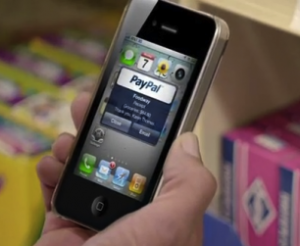PayPal Shuns NFC as It Offers Sneak Peek at Point-of-Sale Strategy

PayPal gave a preview of what it sees as the “future of shopping” and noticeably absent in that sneak peek was NFC technology.
The online payments giant, which has about 100 million accounts worldwide, is planning to use mobile network, bar-code and conventional point-of-sale terminal technology in its attempts to make the leap from online to physical payments. Consumers, for example, could enter their phone numbers and PIN codes on POS terminals to pay and avoid checkout lines in stores. At least for now, NFC is not part of PayPal’s plans at the physical point of sale.
PayPal president Scott Thompson, in fact, took a swipe at NFC and apparently the Google Wallet when he made clear in his blog Wednesday that “we’re not just shoving a credit card on a phone.
“If we said, ‘throw away your terminals and get a new one, or buy a new phone’…no one has that level of influence and pull,” he reportedly said at a partner event Wednesday attended by merchants. “We can’t be so bold or arrogant to think that you’ll adopt to the standards we’ve created.”
In an interview with All Things Digital, Thompson reportedly added that NFC, at least at present, has far too little reach.
“If we only built something that worked with this phone, this bank, and this network and NFC, you might address 50 people out of the 350 million people in the U.S.,” he reportedly said. “We hope that all 350 million people use what we are doing today.”
But sources have told NFC Times that PayPal, which is a unit of online marketplace eBay, is working with a number of technologies, including NFC, to try to bring its payments service to the physical world–though it is not necessarily planning to use NFC directly at the point of sale.
In July, Paypal unveiled a peer-to-peer payments service using NFC that it might launch commercially. Users would tap their phones together to initiate a network-based transfer.
Laura Chambers, senior director for PayPal Mobile, said in a blog post at the time that “we’ve been looking at NFC technology for a while, and we saw a tremendous opportunity to combine the best of NFC and the best of PayPal.” She added: “This (NFC) is just one of the many ways we’re using different technologies on different devices to change the way people pay and get paid.”
Whatever technology it uses, PayPal faces an uphill battle in taking on payments giant Visa Inc. and other established players at the physical point of sale.
Thompson, however, promised that next year the company would announce retailers accepting PayPal at the point of sale, and they’ll be some “very big merchants.”












